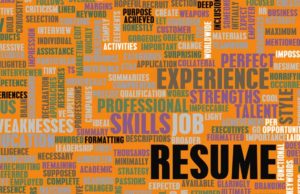 Answer: Here are questions for you consider. What is the overall tone of your resume? When a hiring manager looks at your resume for the first time what is the visual impression it makes? As she starts to read it, how does she feel about your message? Is she struggling with the copy?
Answer: Here are questions for you consider. What is the overall tone of your resume? When a hiring manager looks at your resume for the first time what is the visual impression it makes? As she starts to read it, how does she feel about your message? Is she struggling with the copy?
Your unintended impression can be self-centered and the information incomplete. Or, you can succeed in delivering a very positive message. She can decide that the tone of your resume reflects how you perform. By the second paragraph she could decide she doesn’t like your resume and reject you. Or she could be feeling you are genuinely reaching out to her—all this in a matter of seconds. Here is #4 in the resume series about current trends that affect how you craft your resume.
Why is reading resumes such a chore? Wouldn’t it be less onerous if the reader actually liked what the resumes told her/him about the applicant? What if the resume were so well-crafted that the reader was delighted to learn about the job-seeker. Done well, a resume tells a story that is down to earth, factual and clearly written. The tone, which is so important, is conversational.
If you read most resumes out loud they seem to be shouting, “look at me; look what I have done.” There are others that are so self-promoting that they read like a commercial or an advertisement. Instead of inviting communication, that arrogant tone shuts off dialog. It’s as if the candidate decided to raise the volume and say, “Pay attention to me and not to anyone else.” That is the wrong approach–the hiring manager is not partially deaf. Does she instinctively decide this type of thinking as expressed in the resume, is too “me” focused to join the team? Here is an example of what I mean by shouting. This was the introductory paragraph of a resume.
“A senior-level communications professional with more than 20 years experience and a rare combination of a visionary approach, and strategic and tactical skills, along with a contagious, passionate and team-motivated desire to achieve complete success. Possesses exceptional leadership skills, excels in team building and mentoring high-potential team members. Media and public relations (financial and business, crisis communications and issues management, and consumer) brand positioning, and marketing and advertising experience in retail and consumer products businesses. Accomplished in strategic planning; marketing and public relations; leadership of cross-functional teams; budget development; sponsorship negotiation and management; and special event management. Skilled in planning, organization, detail and multiple task management, building and maintaining key relationships, hiring and training, and field communications. Strengths include flexibility, relationship building, public speaking, calmness and creativity, while consistently performing in a high-growth environment.”
And then there are the academic style of resumes that lecture you by telling you everything about them in 4-pages (or more) because all that detail is what the candidate is sure you should care about. (And, of course you don’t.) That candidate has little regard for your time, displays a lack of judgment and is out of touch with current business practices. The inability to edit the material effectively sets the wrong tone and signals a lack of clarity about the way the candidate thinks. Would you want to hire this candidate to lead a comms team?
Write the resume as if you are having a conversation over a cup of coffee and you are pressed for time to make your point effectively. You need to keep the tone low-key, encourage next steps and wrap up the meeting. Isn’t that what the resume accomplishes accompanied with a well-constructed cover note?
Here is an example of how that introduction (above) was replaced with a brief statement followed by a detailed work history. A cover note was crafted to provide specific examples of work that fit the job description. (The client liked the resume and note. The candidate was interviewed and received an offer.)
“As a solo consultant, I provide strategic communications and marketing planning and execution to companies and public relations agencies. I bring xx years of experience in corporate communications, marketing, executive communications, public relations, executive facilitation and reputation management to meet client needs. Client roster includes companies in global manufacturing and commercial service, commodities research, education, food, internet and pharmaceutical industries
(From 20xx – 20xx)
Company Name…“Xxxx Consultant»
senior vice president, account director
- Initially led successful national launch of the xxxxt, a consumer rebranding effort, for xxxxx r by creating Brand Message Architecture
- Won xxxx Co. as an agency of Record (AOR) $1MM account and joined agency as senior vice president
- Built industry analyst relations function to validate the rebranding effort with mobile consumers
(20xx-20xx)
Company… Xxxx Inc.
vice president, Corporate Communications” (additional details provided in the resume) ….
There is tendency to use more formal language in the resume. I don’t recommend that; clarity and easy-to-understand sentence structures should prevail.
The layout should reinforce the message that the information is easy to absorb. Keep the look uncluttered and not distracting with fancy graphics. For VP Comms positions, it is all about clarity and a presentation that honestly presents (without assuming unreasonable credit) what s/he has achieved. For the hiring manager, the conclusion is, this candidate “gets what I need to know, and how to deliver that message without wasting my time.”
